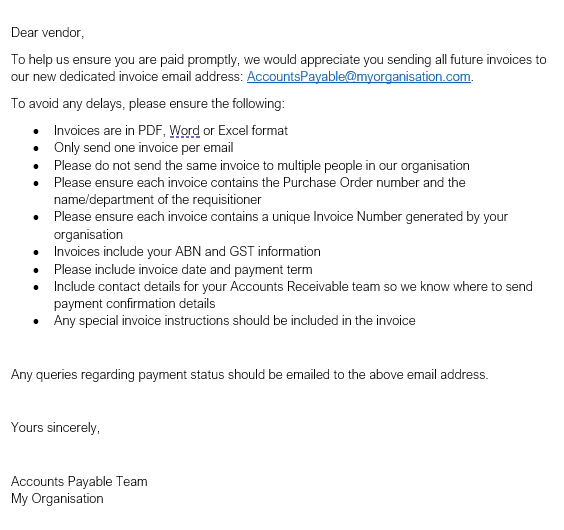Managing invoices can be a time-consuming and complicated process. Because it involves tracking multiple payments and expenses, it requires accuracy and a highly organized approach to avoid costly mistakes.
But the right tools and practices can help Accounts Payable (AP) teams do more with less when it comes to day-to-day invoice management. They help streamline processes and improve cash flow, all while embedding stronger security across each step.
This article will explore those tools, practices, and tips, along with all the basics financial professionals should know about invoice management.
What is invoice management?
Invoice management is the process of tracking, managing, and paying supplier invoices, a crucial element of any AP function.
This includes recording the details of invoices, generating reports, and tracking the status of payments. Invoicing management encompasses creating invoices, tracking and sending reminders for payments, and generating reports for accounting purposes.
Why is this important?
Invoice management generally comes under the realm of the AP team and is part of the procure-to-pay cycle. That being said, AP teams are responsible for the following:
Scheduling timely payments to prevent delays and errors in receiving or paying for goods and services
Reviewing and approving invoices before they're paid. This involves checking that the invoice details match the purchase order and verifying the amounts due
Maintaining accurate records of all incoming invoices and outgoing payments such as payment amounts, dates of payments, and supplier credentials (e.g. first name, business name, etc.)
Investigating and resolving any potential disputes about payment issues
Overall, AP teams play a crucial role in managing invoices and ensuring that payments are made accurately and on time. However, if businesses don’t manage their invoices correctly, it can create vulnerabilities that cybercriminals are eager to exploit.
For instance, cybercriminals can impersonate suppliers and send seemingly legitimate invoices to AP teams – in other words, “invoice fraud.” All it can take to deceive your AP team is an incorrect invoice number or a lookalike email address.
Especially during busy periods, people aren’t perfect and sometimes trust a message or link that they shouldn’t trust. Today’s social engineering tactics and phishing messages are far more sophisticated than the “Nigerian prince” email scams of yesteryear – it’s easier to fall victim than you might think.
So what can you do to prevent invoice fraud and other types of cybercrime? Here are some tips to get you started.
10 tips for effective invoice management
Now that we have discussed the importance of invoice management, let's examine some tips for good invoice management:
Use secure invoicing software: Using professional invoicing software can help streamline your invoicing process, making it easier to create, send, and track invoices. There are many invoicing software options available, so choose one that suits your business needs.
Include all relevant details: Ensure that your invoices include all relevant details, such as the client's name and contact information, invoice date, payment due date, description of services or products, and a breakdown of costs. Providing clear and concise invoices can help prevent misunderstandings and disputes over payments.
Limit access to invoicing software: Limiting access to your invoicing software can help prevent unauthorized access to your business's financial information. Only grant access to employees who need it, and ensure that all access is logged and monitored.
Set clear payment terms: Set clear payment terms, such as the payment due date and any late payment fees, to avoid any confusion or misunderstandings. Communicate these terms clearly with your clients and ensure that they understand them before beginning any work.
Follow up on late payments: If a client fails to make a payment by the due date, follow up with a friendly reminder. Late payments can have a significant impact on your business's financial health, so it's essential to stay on top of them. Again, the right tech stack and invoicing software can help automate some of these steps so that you don't always have to manually track which payments are late.
Analyse your invoicing process: Regularly analyse your invoicing process to identify any areas that can be improved. This may include automating specific tasks, simplifying your invoicing templates, or providing incentives for early payments.
Keep software updated: Keeping your invoicing software updated can help you stay protected against the latest cyber threats. Ensure that all software updates and patches are applied as soon as possible.
Monitor invoicing activity: Monitoring invoicing activity can help you identify any suspicious activity and prevent cybercrime. Regularly review your invoicing logs and investigate any unusual activity.
Use multi-factor authentication: Using multi-factor authentication can provide an extra layer of security for your invoicing software. This can prevent unauthorized access to your invoicing software even if someone has your password. The Australia Cyber Security Centre (ACSC) provides a complete guide to MFA implementation.
Regularly backup your data: Regularly backing up your invoicing data can help you recover in case of a cyberattack or data loss. Ensure that your backups are stored securely and are updated regularly.
The benefits of effective invoice management
Increasing efficiency with automation
By implementing automated invoice management, you can save time and money to focus on other essential aspects of your business. Invoice management software can assist with accurate data processing, faster invoice processing, and more. Effective invoice management also helps ensure that all invoices are accurate, which reduces the risk of errors that could be exploited by cybercriminals. When all invoices are checked for accuracy and authenticity, it's easier to spot any irregularities or inconsistencies.
Improving cash flow
Timely invoicing can ensure that you receive payments on time, improving your cash flow. You can pay invoices faster allowing you to reduce the time between invoicing the supplier and payment through effective invoice management.
Enhanced security
With effective invoice management, you can implement strict security protocols to safeguard your financial data. This might include measures like encryption, password protection, and multi-factor authentication. By making it harder for cybercriminals to access your financial information, you can reduce the risk of fraudulent activities.
Maintaining accurate records
Keeping accurate records is essential for any business, and invoice management plays a vital role in maintaining these records. An efficient invoicing system will ensure that all invoices are recorded, tracked, and easily accessible. This will help you keep track of outstanding payments, identify late-paying clients, and maintain a clear record of all financial transactions.
Building strong client relationships
Effective invoice management also empowers you to build and maintain stronger client relationships. Clear, concise, timely invoices demonstrate reliability and professionalism while reducing the risk of misunderstandings and payment disputes.
Stronger fraud detection
When you have a robust invoice management system in place, you're better equipped to detect fraud. For example, you might notice patterns of suspicious activity or unauthorized transactions that indicate someone is attempting to defraud you. By detecting fraudulent activity early, you can take steps to stop it and minimize any damage.
A strong focus on email security
Invoicing is a crucial aspect of any accounts payable function – finding better ways to manage it is key to maintaining a healthy cash flow and mitigating cyber risks. Streamlining your invoicing system may require a bit of extra effort, but it can end up saving money and time in the long run, especially amid rising cybercrime rates.
You can add an extra layer of security by creating a dedicated email to manage invoices. Here’s an example of a dedicated AP email address:

A dedicated accounts payable email address for invoices can simplify the task of managing and tracking payments, along with minimizing your exposure to phishing emails. Technology-enabled solutions can also ensure another layer of security, without requiring more time or effort from staff. For instance, Eftsure’s solution ensures that you’re paying the intended supplier by matching the BSB and account number – this is a centralized, automated approach that reduces the amount of human error and oversight at play.
With our real-time alert system, your AP team can identify each outgoing payment and ensure it is being sent to the intended legitimate supplier.
For a demonstration of how Eftsure can help manage your invoices from fraud, error, or cybercrime, contact us today.
Streamline your supplier onboarding with our checklist
Having accurate supplier onboarding is vital for finance teams to reduce risk, detect fraud, comply with regulations, and maintain strict accounts payable controls. The payment process starts with supplier onboarding, which is time-consuming but necessary.
Download our procure-to-pay checklist to simplify your onboarding process.








